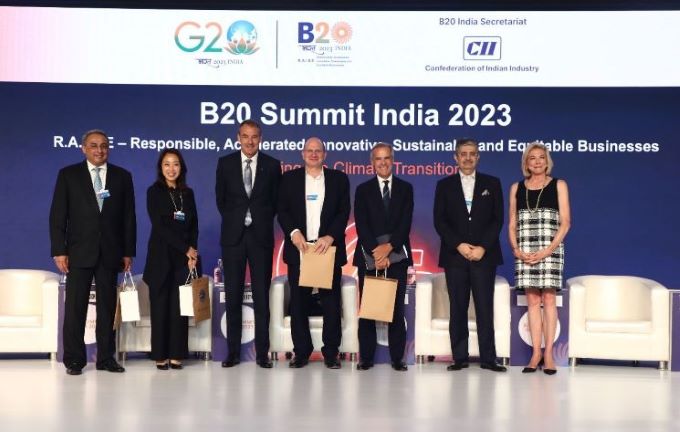Financing the Climate Transition: Remarks by Lynn Forester de Rothschild at the B20 Summit

While at B20 India, I had the opportunity to be a part of an amazing panel of both industry and finance to take on the very important question about financing the climate transition. We need to think of this as both an obligation and also as an opportunity. We have to create a vital and effective partnership between the public and private markets if we are going to solve the climate problem. There’s no option. The strongest force in the world is the private market and we need to make it work and we need to make it work for all constituencies.
But first, we need to define the problem. It’s really not just about greenhouse gases. It’s not just about 1.5 or 2 degrees Celsius. It’s also about how the transition affects people, how it affects the price of energy, how it affects our national security, and how it affects workers. I’ve often felt that the environmental movement missed the people part of it, and I’m very grateful to Bernard Looney and Mark Carney, because they joined the Council for Inclusive Capitalism with me and have long advocated for this approach.
The Council was inaugurated by Pope Francis in 2019 and was inspired by the Pope. The Council was created in response to the Laudato Si’ in which he talked about the climate and that we had to listen to the cry of the earth and the cry of the poor. We must always keep this framing in mind when we think about the problem. We used that framing while creating the Council’s Just Energy Transition Framework, and we must all continue to work along those lines.
We must think about the scale of the problem too. We have been on this planet for 300,000 years and somehow, we’ve just managed to screw it up in the last 60 years. It’s our obligation to fix it.
According to the World Economic Forum, 44% of global economic activity is somehow dependent on nature and 1.2 billion or 40% of global jobs are dependent upon climate, so the scale is enormous. But unfortunately, to fix it is going to cost a lot of money. Bloomberg says it’s going to be $200 trillion or $7 trillion a year. Uday Kotak, Chair of the B20 India Task Force on Financing for Global Economic Recovery, said that it’s going to take $4.5 trillion over the next 7-10 years to meet the global social development goals.
Unfortunately, we are not even close to financing this fix. From 2011 to 2020, between public and private finance, there’s been about $4.8 trillion toward this problem. We really need to up our game and commit more financing, from both the private sector and the public sector.
The good news is that by doing it, we will be creating opportunities. The World Economic Forum says there are 365 million jobs that will be created by transferring our economy to a clean economy, and it will add $10 trillion dollars a year in economic growth. Mark Carney noted that there is growing financing for this work and highlighted the encouraging fact that investment in clean energy is now a bigger market than in conventional energy.
While we have a long trek ahead of us, we are making progress, and commitments to the transition. We’re doing this for the same reason that President Kennedy said we should try to go the Moon – we do this not because it is easy, but because it is hard. . .
Watch the recording of the full conversation on “Financing the Climate Transition” here.
